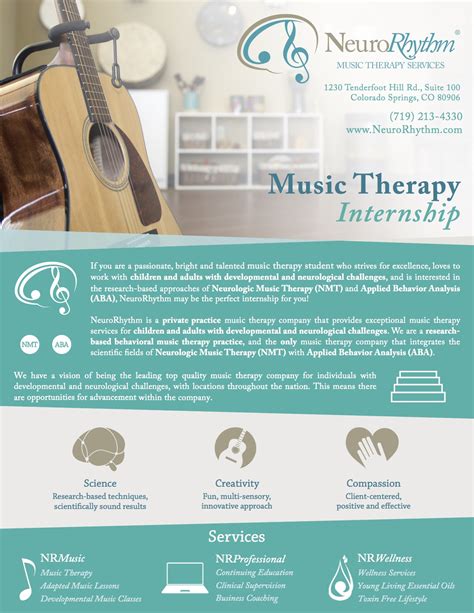Music therapy, an evidence-based therapeutic approach, harnesses the transformative power of music to improve individuals’ physical, emotional, and cognitive well-being. As an aspiring music therapist, an internship provides an invaluable opportunity to delve into the intricacies of this profession, gaining hands-on experience and shaping your future as a compassionate and effective practitioner.

Purpose of a Music Therapy Internship
- Gain practical experience working with diverse client populations
- Apply theoretical knowledge to real-life settings
- Develop essential clinical skills and techniques
- Enhance interpersonal and communication abilities
- Build a strong foundation for professional development
Benefits of a Music Therapy Internship
- Improved Clinical Skills: Internships offer a platform to refine your assessment, intervention, and documentation skills, fostering a solid clinical foundation.
- Therapeutic Presence: Interacting with clients in a therapeutic setting cultivates empathy, active listening, and the ability to provide a safe and supportive space for healing.
- Professional Growth: Supervised practice by experienced music therapists guides your development, fostering professional growth and preparing you for future employment.
- Network Expansion: Internships offer opportunities to connect with other professionals, such as music therapists, healthcare providers, and educators, creating valuable professional relationships.
- Career Exploration: By working in different clinical settings, you can explore various areas of music therapy, solidifying your career aspirations.
Pain Points of Music Therapy Internships
- Competition: Finding a suitable internship can be competitive due to the high demand for these experiences.
- Unpaid Positions: Some internships may not offer compensation, requiring you to balance your financial needs with your professional goals.
- Rigorous Schedule: Internships typically demand a significant time commitment, requiring you to manage your work-life balance effectively.
Motivations for Pursuing a Music Therapy Internship
- Passion for Music and Healing: Internships allow you to share your love of music while making a positive impact on others’ lives.
- Personal Growth: The challenges and rewards of an internship foster personal growth, resilience, and a deeper understanding of yourself.
- Career Advancement: Internships serve as a stepping stone to a successful career in music therapy, providing a competitive edge in the job market.
- Community Involvement: Working in various settings allows you to engage with the community and make a meaningful contribution to society.
- Academic Fulfillment: Internships complement classroom learning by applying theoretical concepts to practical experiences.
Common Mistakes to Avoid During Music Therapy Internships
- Overextending Yourself: Avoid taking on excessive responsibilities to maintain a healthy work-life balance and prevent burnout.
- Neglecting Supervision: Regular supervision is crucial for your development. Seek guidance and feedback from your supervisor to ensure optimal growth.
- Lack of Initiative: Embrace learning opportunities and take initiative to expand your skills and contribute to the internship team.
- Poor Documentation: Accurate and detailed documentation is essential. Ensure your assessments, interventions, and progress notes are thorough and timely.
- Inappropriate Boundaries: Maintain professional boundaries with clients and colleagues to foster a respectful and therapeutic environment.
Pros and Cons of Music Therapy Internships
Pros:
- Practical experience and clinical skill development
- Exploration of diverse populations and areas of music therapy
- Professional networking opportunities
- Personal growth and leadership opportunities
- Potential for future employment
Cons:
- Competition for limited internships
- Unpaid positions
- Rigorous schedule
- Balancing work-life commitments
- Potential for stress and burnout
Innovative Applications of Music Therapy
Music Neuroimaging: Exploring the neural correlates of music therapy interventions to optimize treatment techniques.
Virtual Reality Music Therapy: Integrating virtual reality technology to create immersive and personalized therapeutic experiences.
Music Therapy for Autism Spectrum Disorder: Utilizing music therapy to improve social communication, reduce sensory sensitivities, and enhance adaptive behaviors.
Music Therapy in Palliative Care: Music therapy offers comfort, reduces anxiety, and enhances the quality of life for individuals facing end-of-life care.
Creative Musicology: Generating new music and sonic experiences tailored to specific therapeutic needs, embracing the therapeutic potential of improvisation and composition.
Tables
Table 1: Statistics on Music Therapy
| Statistic | Source |
|---|---|
| 1 in 10 people in the US has experienced Music Therapy | National Endowment for the Arts |
| 74% of people with dementia have shown improvement in cognitive function and behavioral symptoms | American Music Therapy Association |
| Music therapy has been shown to reduce pain by 30% | National Center for Complementary and Integrative Health |
Table 2: Benefits of Music Therapy in Different Settings
| Setting | Benefits |
|---|---|
| Healthcare | Pain management, stress reduction, emotional regulation |
| Education | Academic performance, social skill development, language acquisition |
| Mental Health | Depression, anxiety, trauma |
| Rehabilitation | Physical recovery, cognitive rehabilitation, speech therapy |
Table 3: Common Clinical Skills in Music Therapy
| Skill | Description |
|---|---|
| Assessment | Evaluating clients’ needs and creating tailored interventions |
| Intervention | Utilizing various music techniques to address therapeutic goals |
| Documentation | Accurate and comprehensive recording of client progress |
| Supervision | Seeking guidance and feedback from experienced music therapists |
Table 4: Career Outlook for Music Therapists
| Statistic | Source |
|---|---|
| Projected growth of 18% from 2019-2029 | Bureau of Labor Statistics |
| Median annual salary of $48,920 in 2021 | Bureau of Labor Statistics |
| Top employers include schools, hospitals, and private practices | Bureau of Labor Statistics |
